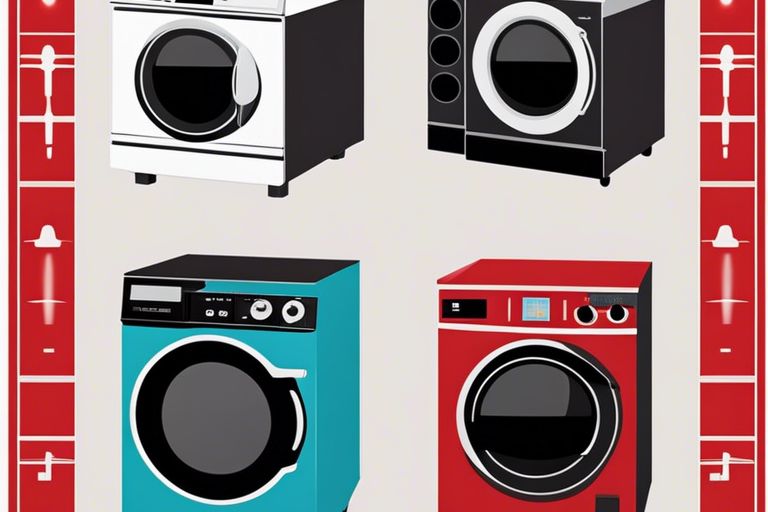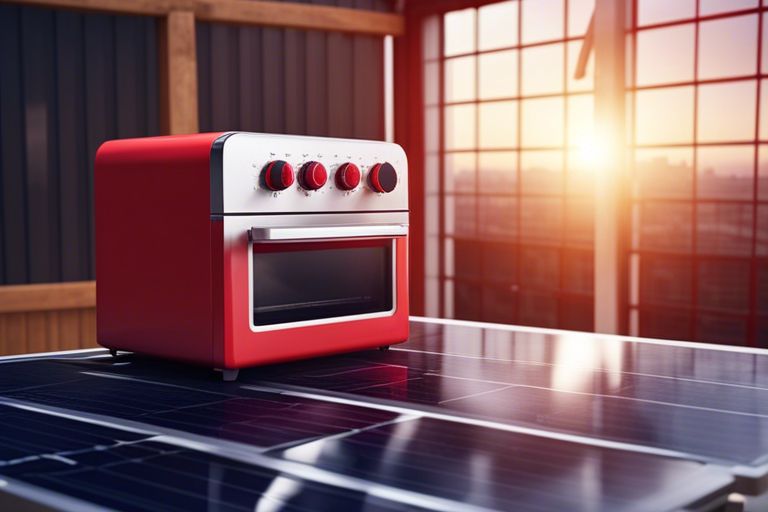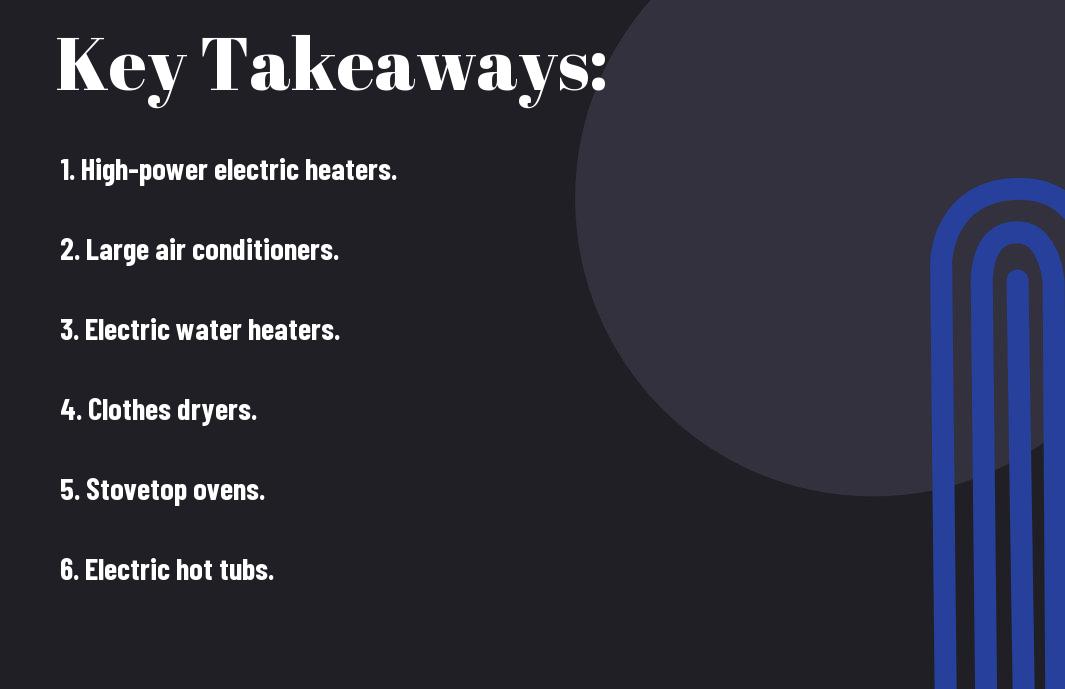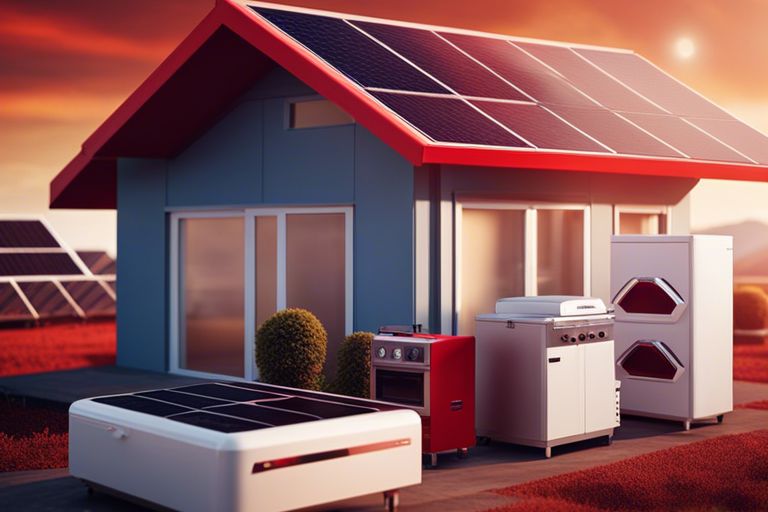Heater, air conditioner, and electric water heater are examples of appliances that cannot be effectively powered by solar energy alone. These devices require a significant amount of electricity to function, which may exceed the capacity of your solar power system. It’s important to understand the limitations of solar power when choosing which appliances to use, to ensure your energy needs are met efficiently and effectively.
Key Takeaways:
- High-power appliances: Appliances with high power requirements, such as electric ovens, electric water heaters, and air conditioners, are not suitable for use with solar power.
- Appliances with large motors: Appliances with large motors, like refrigerators, freezers, and washing machines, may draw too much power at startup and may not be compatible with solar power systems.
- Appliances with heating elements: Appliances that primarily rely on heating elements, such as hair dryers, toasters, and space heaters, are not ideal for use with solar power due to their high energy consumption.

Limitations of Solar Power
Energy Intensity Requirements
To effectively run certain high-power appliances with solar power, you need to consider the energy intensity requirements of these devices. Appliances like air conditioners, electric heaters, or induction stoves have high energy demands that may exceed the capacity of your current solar setup. In such cases, you may either need a larger solar power system or alternative energy sources to supplement your electricity needs.
High-Power Appliances
High-power appliances such as clothes dryers, electric water heaters, and electric stoves typically draw a significant amount of electricity during operation. These devices can strain a conventional solar power system, especially if used frequently or simultaneously. You may find it challenging to power these appliances solely with solar energy, as they may lead to high energy consumption and possibly drain your solar batteries quickly.
For instance, running a clothes dryer with solar power may not be practical, as it consumes a substantial amount of energy in a short period. In such cases, you may need to rely on grid power or consider energy-efficient alternatives to reduce your overall electricity consumption.
Kitchen Appliances
Electric Ovens and Stoves
Any electric ovens and stoves are not recommended for use with solar power. These appliances require a significant amount of energy to operate, especially when heating up to high temperatures for baking or cooking. The power draw from electric ovens and stoves may exceed the capacity of your solar system, leading to potential overloads and system failures.
Microwave Ovens
One type of kitchen appliance that you might want to reconsider using with solar power is the microwave oven. Microwaves are known for their relatively high power consumption, especially when heating or cooking food quickly. This sudden demand for power can strain a solar power system, especially if multiple high-power appliances are used simultaneously.
To ensure that your solar power system can adequately support a microwave oven, consider investing in energy-efficient models that consume less power. Additionally, try to limit the use of the microwave during times of low solar energy production, such as cloudy days or at night.
Dishwashers
Dishwashers are another kitchen appliance that you should be cautious about using with solar power. These appliances require both electricity and hot water to operate efficiently, increasing their overall energy consumption. Running a dishwasher on solar power may drain your system quickly, particularly if used frequently or with other high-energy devices simultaneously.
Another consideration with dishwashers is the potential for water heating. If your dishwasher relies on electricity to heat the water, the combined energy requirements for both the appliance and water heating can strain a solar power system. You may want to explore energy-efficient dishwasher models or adjust your usage patterns to minimize the impact on your solar energy production.

Laundry and Cleaning
Once again, when it comes to using solar power for your laundry and cleaning appliances, there are some limitations you need to be aware of. Let’s examine the specific appliances in this category.
Electric Dryers
An electric dryer is a high-power appliance that demands a lot of energy to operate efficiently. Unfortunately, using a traditional electric dryer with solar power can be quite challenging. The energy consumption of electric dryers is relatively high, and they may not always be compatible with standard solar power systems.
Washing Machines
Washing machines are vital for keeping your clothes clean and fresh. While some energy-efficient washing machines can be used with solar power, older models or those with high energy consumption may not be the best fit. It’s vital to check the energy requirements of your washing machine to ensure that it can be effectively powered by solar energy.
In terms of washing machines, front-loading models are typically more energy-efficient compared to top-loading ones. Choosing an energy-efficient model can help you optimize your solar power system’s performance and reduce your overall energy consumption.
Vacuum Cleaners
With vacuum cleaners, you need to be cautious when using them with solar power. Some vacuum cleaners, especially those with high power and suction capabilities, may not be suitable for standard solar power setups. The energy demand of these appliances can be too high for solar power systems to handle efficiently.
When choosing a vacuum cleaner for use with solar power, consider opting for a cordless or energy-efficient model. These types of vacuum cleaners are designed to operate on lower power consumption, making them more compatible with solar energy sources.
Heating and Cooling
Your household heating and cooling systems are vital for maintaining a comfortable indoor environment. However, when it comes to using solar power, there are certain appliances that may not be compatible due to their high energy consumption.
Central Air Conditioning Units
One of the major challenges of running central air conditioning units on solar power is their high energy demand, especially during peak usage times. These units require a significant amount of electricity to cool your entire home efficiently, which can strain a typical solar power setup.
Electric Space Heaters
Units that rely on electricity, such as electric space heaters, can also be problematic when trying to power them with solar energy. These heaters draw a large amount of power to generate heat quickly, making them less suitable for solar power systems with limited capacity.
With electric space heaters, it’s important to consider their energy efficiency ratings and usage patterns before attempting to run them on solar power. Opting for more energy-efficient heating alternatives, such as heat pumps or radiant heating, may be a better choice for your solar-powered home.
Water Heaters
Any appliance that heats water, including traditional storage tank water heaters, can be challenging to run on solar power. Heating water consumes a significant amount of energy, especially if you have a large household with high hot water demand.
When considering solar power for your home, it’s vital to evaluate your water heating needs and explore more energy-efficient options like tankless water heaters or solar water heating systems. These alternatives can help you reduce your overall energy consumption and make better use of your solar-generated electricity for other appliances.
Electronics and Entertainment
Many Solar Power, an Idiot’s Guide may not cover the nuances of using solar energy for electronics and entertainment devices. Let’s research into some common appliances in this category that may not be suitable for use with solar power due to their high energy consumption.
Gaming Consoles
On the list of appliances that may pose a challenge when powered by solar energy are gaming consoles. These devices often require a significant amount of power to run smoothly, especially during intense gaming sessions where they can draw a substantial amount of electricity. If you are an avid gamer, you may need to consider alternative power sources or energy-saving settings for your gaming console when running it on solar power.
High-End Computers
One appliance that you may need to reconsider using with solar power is a high-end computer. These machines are designed for high-performance tasks such as gaming, video editing, or graphic design, and they often consume a lot of power. When powered by solar energy, you may encounter challenges if your system requires more electricity than your solar setup can provide consistently.
The energy demands of high-end computers can fluctuate depending on the tasks you are performing. It’s imperative to assess your computer’s power requirements and the capacity of your solar system to ensure a stable power supply for your computing needs.
Home Theaters
Any home theater setup with multiple components like a big screen TV, sound system, gaming console, and streaming devices may not be ideal for running on solar power alone. These entertainment systems can consume a considerable amount of electricity, especially when used for extended periods or when hosting movie nights or gaming sessions. It’s crucial to balance the energy consumption of your home theater components with the capabilities of your solar setup to avoid running into power supply issues.
Theaters
Industrial and Commercial Appliances
Despite the advancements in solar technology, there are certain industrial and commercial appliances that may not be suitable for use with solar power. This is mainly due to their high energy consumption and specialized requirements.
Heavy-Duty Machinery
For heavy-duty machinery used in industries such as manufacturing, construction, or mining, the energy demands can be exceptionally high. These machines often require a consistent and substantial power supply, which may not be easily met by solar energy alone. In such cases, alternative power sources or a combination of solar and traditional power systems may be more practical.
Commercial Refrigeration Units
The use of solar power for commercial refrigeration units can be challenging due to their constant need for energy to maintain proper temperature levels. These units typically run around the clock, requiring a consistent power supply. While it is possible to power smaller refrigeration units with solar energy, larger commercial units may need supplementary power sources.
Appliances that are vital for business operations, such as industrial and commercial refrigeration units, need to be carefully assessed before transitioning to solar power. It’s crucial to consider the energy requirements and the feasibility of powering these appliances solely with solar energy.
Industrial Lighting Systems
Units
With the rise in energy-efficient LED lighting, many industrial facilities are looking to upgrade their lighting systems. While it is possible to power industrial lighting with solar energy, the extensive lighting needs of large warehouses or manufacturing plants may pose a challenge. It’s important to assess the energy requirements of industrial lighting systems before transitioning to solar power to ensure adequate illumination levels are maintained.

Summing up
Now that you have a better understanding of what appliances cannot be used with solar power, you can make more informed decisions when it comes to your energy usage. Note, high-power appliances like electric furnaces and water heaters can strain your solar power system and may not be suitable for solar energy. It’s important to consider the energy requirements of your appliances before deciding to power them with solar energy.
By knowing which appliances are not compatible with solar power, you can optimize your energy usage and make the most of your solar power system. Consider investing in energy-efficient alternatives or using these high-power appliances sparingly to minimize strain on your solar power system. With the right information and careful planning, you can effectively harness the power of solar energy to meet your household needs.
Q: Can I run high-power appliances like air conditioners and electric heaters on solar power?
A: No, high-power appliances such as air conditioners and electric heaters typically require more electricity than solar power systems can generate, especially during peak usage times.
Q: Can I use large kitchen appliances like electric stoves and ovens with solar power?
A: It is not recommended to run large kitchen appliances like electric stoves and ovens on solar power, as they draw a significant amount of electricity and can quickly drain your solar power system.
Q: Can I run power-hungry devices like hair dryers and electric kettles on solar power?
A: While it is possible to run smaller power-hungry devices like hair dryers and electric kettles on solar power, using them frequently may deplete your system’s stored energy quickly.
Q: Are electric vehicles compatible with solar power for charging?
A: Electric vehicles can be charged using solar power, but the size of your solar power system and the energy consumption of the vehicle will determine how efficient and practical this setup is.
Q: Can I use energy-intensive appliances like washing machines and dryers with solar power?
A: Energy-intensive appliances like washing machines and dryers can be used with solar power, but it is advisable to time their usage during sunny days or when the solar panels are generating the most electricity to ensure optimal performance.
